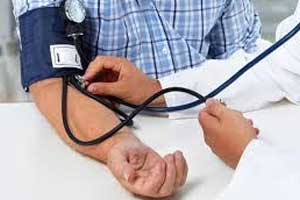- Home
- Editorial
- News
- Practice Guidelines
- Anesthesiology Guidelines
- Cancer Guidelines
- Cardiac Sciences Guidelines
- Critical Care Guidelines
- Dentistry Guidelines
- Dermatology Guidelines
- Diabetes and Endo Guidelines
- Diagnostics Guidelines
- ENT Guidelines
- Featured Practice Guidelines
- Gastroenterology Guidelines
- Geriatrics Guidelines
- Medicine Guidelines
- Nephrology Guidelines
- Neurosciences Guidelines
- Obs and Gynae Guidelines
- Ophthalmology Guidelines
- Orthopaedics Guidelines
- Paediatrics Guidelines
- Psychiatry Guidelines
- Pulmonology Guidelines
- Radiology Guidelines
- Surgery Guidelines
- Urology Guidelines
Lowering systolic BP in 130–140 mm Hg range of no benefit, increases adverse events: BMJ Study

Sweden: Hypertension has been defined as blood pressure (BP) ≥140/90 mm Hg for decades now and the corresponding recommended treatment goal has been <140/90 mm Hg. However, a recent review in the BMJ Open journal has found that BP lowering in 130–140 mm Hg systolic blood pressure offers no cardiovascular benefits, instead increases the risk of adverse events.
This systematic review and meta-analysis led by Mattias Brunstrom, Department of Public Health and Clinical Medicine, Umeå University, Umeå, Sweden, aimed to evaluate the benefits and harms of antihypertensive treatment in the 130–140 mm Hg systolic blood pressure range.
For the purpose, the researchers searched online databases for randomized double-blind trials with ≥1000 patient-years of follow-up, comparing any antihypertensive agent against placebo. Eighteen trials, including 92 567 participants (34% women, mean age 63 years), fulfilled the inclusion criteria
Key findings include:
- Primary preventive antihypertensive treatment was associated with a neutral effect on all-cause mortality (relative risk 1.00) and major cardiovascular events (1.01, 0.96 to 1.06), but an increased risk of discontinuation due to adverse events (1.23, 1.03 to 1.47).
- None of the secondary efficacy outcomes were significantly reduced, but the risk of hypotension-related adverse events increased with treatment (1.71, 1.32 to 2.22).
- In coronary artery disease secondary prevention, antihypertensive treatment was associated with reduced risk of all-cause mortality (0.91, 0.83 to 0.99) and major cardiovascular events (0.85, 0.77 to 0.94), but doubled the risk of adverse events leading to discontinuation (2.05, 1.62 to 2.61).
Also Read: Now ‘Exercise Pill’ for lowering High Blood Pressure
"Primary preventive blood pressure lowering in the 130–140 mm Hg systolic blood pressure range adds no cardiovascular benefit, but increases the risk of adverse events. In secondary prevention, benefits should be weighed against harms," concluded the authors.
More information: "Benefits and harms of lower blood pressure treatment targets: systematic review and meta-analysis of randomised placebo-controlled trials" published in BMJ Open.
DOI: http://dx.doi.org/10.1136/bmjopen-2018-026686
Journal Information: BMJ Open

Disclaimer: This site is primarily intended for healthcare professionals. Any content/information on this website does not replace the advice of medical and/or health professionals and should not be construed as medical/diagnostic advice/endorsement or prescription. Use of this site is subject to our terms of use, privacy policy, advertisement policy. © 2020 Minerva Medical Treatment Pvt Ltd